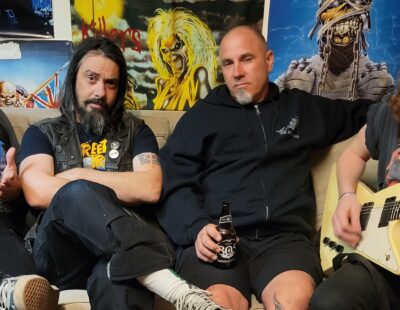Dr. Vivek Venkatesh’s office at Concordia University in Montreal is almost certainly unique in the world of academia. There probably aren’t many professors out there, for instance, who mix and match All Pigs Must Die prints and Latin salsa posters or keep vinyl collections as close at hand as research materials. And if any Decibel readers are aware of another educator with framed, gore-drenched Bloodbath performance shirts adorning his or her walls, please, shoot us an email and blow our minds a second time.
“When students come in to talk to me I’ll point at the Bloodbath shirts and tell them ‘Here’s what happens if you don’t do the reading for my class,’” Venkatesh laughs.
That is a priceless image, but Venkatesh drags heavy metal culture far beyond interior design aesthetics in his recent study of the social mores and folkways of heavy metal message boards “Technological Transparency in the Age of Web 2.0: A Case Study of Interactions in Internet-Based Forums,” recently collected in the textbook Methodologies, Tools and New Developments for E-Learning. (The chapter is available for view and free download here. Friend Venkatesh on Facebook if you’d like to follow/potentially participate in his future research.)
And, yes, as is the case with the vast majority of Professor Venkatesh’s writing, this scholarly discourse was mulled and forged to the beat of many a righteous extreme metal jam.
“More often than not when I first arrive in my office I’ll put on one of the last two Ulver albums — very atmospheric, a great way to get into the flow of things,” Venkatesh says. “While writing I find death metal inspirational — I’ll move from Dead Congregation to old school Entombed to new school Enslaved to old school Morbid Angel. I just recently pulled out the first Sentenced album from 1991, Shadows of the Past. Beautiful! I’ve been writing up some grant proposals lately to songs like ‘Rot to Dead’ and ‘Suffocated Beginning of Life.’”
However unorthodox the soundtrack, it’s tough to argue with results: “Technological Transparency in the Age of Web 2.0” is an accessible-yet-heady dissection of notions of expression and identity development; assigned status and power differentials in the online world (i.e., lurkers vs. message board “super users”); knowledge building in communities of practice; written vs. oral communication; democracy vs. technocracy; the rise and flourishing of outcast gurus in niche affinity environments.
Venkatesh is no metalhead looking to shoehorn death metal into his day job — he’s gleaned legit insights about the human psyche from the roiling Lord of the Flies-lite digital realms of Brave Boards, Blabbermouth, and Encyclopedia Metallum.
“We build learning environments based on some classic Old European standards of how people should interact face to face,” Venkatesh explains. “But we’re not even close to fully understanding the cognitive and behavioral mechanisms by which people learn. Given the explosion of Web 2.0 technologies, it would be a pity not to harness what we are discovering about how people interact online to help us build better learning environments.”
The ongoing research project has a pedigree and process which reveals an interesting dichotomy: Venkatesh first considered delving into the digital metal realm after a conversation at a Kreator show with Blake Judd of Nachtmystium about the differences Judd had noticed between his online and physical world interactions with fans, yet most of the research assistants who have helped Venkatesh carry out this research are not heavy metal fans, which helps him avoid muddying the academic waters with the sort of preconceived notions that might lead to inside baseball talk. “If I write up a couple paragraphs of analyses and it doesn’t make sense to [my research assistants] from a layperson’s standpoint,” he says, “I know I have to make it a little clearer.”
Although Venkatesh has never maintained a presence in these forums — it is, indeed, his lack of presence that gives him “ethical permission” to enter that world as a researcher — the India-born Canadian has a special appreciation of the allure niche forums can hold from ten years spent living in Singapore during a time, now happily over, when metal was strictly verboten and CDs by even the most mainstream heavy bands could only be bought as underground bootlegs.
“In the nineties in Singapore we would have killed to have an online forum where we could remain anonymous and discuss our needs and desires and have our genre-splitting debates without being policed,” Venkatesh says. “So I understand that although the degree of malignment metalheads face varies according to place and culture, message boards like the ones I write about can give users everywhere the opportunity to be who they want to be and pursue a lifestyle outside the mainstream without feeling judged or endangered.”
Despite the esteem with which he is held in his department — and as much as the Concordia marketing department is warming up to having a “heavy metal professor” lend a bit of sexiness to the university’s education grad program — the natural separateness of the metalhead is something not even Dr. Vivek Venkatesh can avoid completely.
“When some of my colleagues hear I am researching and writing about heavy metal boards they say, ‘Really? You’re going to be putting this in your dossier as something that’s relevant to education?’” Venkatesh says. “My reply is, ‘This is academic freedom. Let’s see where the research leads.’”
Vivek Venkatesh is so metal he took his seven year-old daughter to see Ghost and set his Facebook handle as “satanrules616.” Join him. He plans to publish a book eventually on his research






